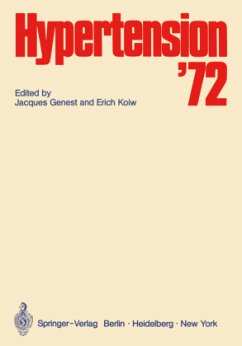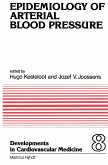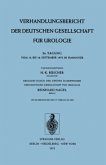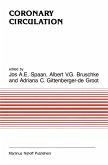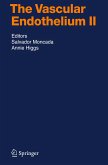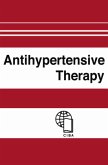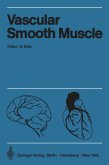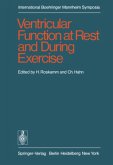Hypertension ¿ 1972
Symposium organized by the Clinical Research Institute of Montreal under the Auspices of the University of Montreal Medical School 1972
Herausgegeben von Genest, J.; Koiw, E.
Hypertension ¿ 1972
Symposium organized by the Clinical Research Institute of Montreal under the Auspices of the University of Montreal Medical School 1972
Herausgegeben von Genest, J.; Koiw, E.
- Broschiertes Buch
- Merkliste
- Auf die Merkliste
- Bewerten Bewerten
- Teilen
- Produkt teilen
- Produkterinnerung
- Produkterinnerung
The Clinical Research Institute of Montreal, inaugurated in April 1967, intro duced a new concept of organization of clinical research in teaching medical centers. Adjacent to the Hotel-Dieu Hospital, a major teaching hospital of the University of Montreal, the "professional" or career clinical investigators were grouped under one roof with common auditorium, seminar rooms, instruments rooms, cold rooms, experimental surgical rooms and illustration department, with administration, accounting division and machine shops at the service of the research workers. Besides its large multidisciplinary…mehr
Andere Kunden interessierten sich auch für
![Epidemiology of Arterial Blood Pressure Epidemiology of Arterial Blood Pressure]() Epidemiology of Arterial Blood Pressure39,99 €
Epidemiology of Arterial Blood Pressure39,99 €![24. Tagung vom 13. bis 16. September 1972 in Hannover 24. Tagung vom 13. bis 16. September 1972 in Hannover]() 24. Tagung vom 13. bis 16. September 1972 in Hannover54,99 €
24. Tagung vom 13. bis 16. September 1972 in Hannover54,99 €![Coronary Circulation Coronary Circulation]() Coronary Circulation39,99 €
Coronary Circulation39,99 €![The Vascular Endothelium II The Vascular Endothelium II]() Salvador Moncada / Annie HiggsThe Vascular Endothelium II223,99 €
Salvador Moncada / Annie HiggsThe Vascular Endothelium II223,99 €![Antihypertensive Therapy Antihypertensive Therapy]() Antihypertensive Therapy39,99 €
Antihypertensive Therapy39,99 €![Vascular Smooth Muscle / Der Gefäßmuskel Vascular Smooth Muscle / Der Gefäßmuskel]() Vascular Smooth Muscle / Der Gefäßmuskel77,99 €
Vascular Smooth Muscle / Der Gefäßmuskel77,99 €![Ventricular Function at Rest and During Exercise / Ventrikelfunktion in Ruhe und während Belastung Ventricular Function at Rest and During Exercise / Ventrikelfunktion in Ruhe und während Belastung]() Ventricular Function at Rest and During Exercise / Ventrikelfunktion in Ruhe und während Belastung77,99 €
Ventricular Function at Rest and During Exercise / Ventrikelfunktion in Ruhe und während Belastung77,99 €-
-
-
The Clinical Research Institute of Montreal, inaugurated in April 1967, intro duced a new concept of organization of clinical research in teaching medical centers. Adjacent to the Hotel-Dieu Hospital, a major teaching hospital of the University of Montreal, the "professional" or career clinical investigators were grouped under one roof with common auditorium, seminar rooms, instruments rooms, cold rooms, experimental surgical rooms and illustration department, with administration, accounting division and machine shops at the service of the research workers. Besides its large multidisciplinary team working on various aspects of hyper tension, the Institute includes research teams in the following fields: 1) neuro biology and Parkinson's disease, 2) lipids and atherosclerosis, 3) molecular biology, 4) immunochemistry, 5) pituitary polypeptides and proteins, 6) nutrition and 7) clinical pharmacology of new drugs. Research is financed entirely by grants obtained from accredited agencies, mostly from the Medical Research Council of Canada. These grant monies constitute about 50 % of the entire budget of the Institute while the other half for administration, maintenance and physical facilities is financed through the support of the Ministry of Social Affairs of Quebec.
Hinweis: Dieser Artikel kann nur an eine deutsche Lieferadresse ausgeliefert werden.
Hinweis: Dieser Artikel kann nur an eine deutsche Lieferadresse ausgeliefert werden.
Produktdetails
- Produktdetails
- Verlag: Springer / Springer Berlin Heidelberg / Springer, Berlin
- Artikelnr. des Verlages: 978-3-540-05755-0
- 1973.
- Seitenzahl: 636
- Erscheinungstermin: 8. Juni 1973
- Englisch
- Abmessung: 244mm x 170mm x 34mm
- Gewicht: 1130g
- ISBN-13: 9783540057550
- ISBN-10: 3540057552
- Artikelnr.: 26714806
- Herstellerkennzeichnung Die Herstellerinformationen sind derzeit nicht verfügbar.
- Verlag: Springer / Springer Berlin Heidelberg / Springer, Berlin
- Artikelnr. des Verlages: 978-3-540-05755-0
- 1973.
- Seitenzahl: 636
- Erscheinungstermin: 8. Juni 1973
- Englisch
- Abmessung: 244mm x 170mm x 34mm
- Gewicht: 1130g
- ISBN-13: 9783540057550
- ISBN-10: 3540057552
- Artikelnr.: 26714806
- Herstellerkennzeichnung Die Herstellerinformationen sind derzeit nicht verfügbar.
Opening Remarks: The Remarkable Story of Hypertension.- Session 1.- Effects of Sympathetic Activity and ACTH on Renin and Aldosterone Secretion.- Contrived Suppression of Renin Secretion During Sodium Depletion.- Mechanism of Increased Renin Secretion Associated with Adrenalectomy, Hemorrhage, Renal Artery Constriction, and Sodium Depletion.- A Comparison of the Effects of Various Catecholamines on Plasma Renin Activity Alone and in the Presence of Adrenergic Blocking Agents.- In Vitro Renin Release by Human Kidney Slices: Effect of Norepinephrine, Angiotensin II and I, and Aldosterone.- Summary of Discussions.- New Observations on Renin Release by the Non-Filtering Kidney.- Functional and Enzymatic Analyses of Single Juxtaglomerular Apparatuses.- Studies on the Intrarenal Action of the Renin-Angiotensin System.- Renin and Renal Function.- Structural and Ultrastructural Alterations in Mesenteric and Renal Arterioles Following Infusion of Vaso-Active Agents.- Summary of Discussions.- Session 2.- Paradoxical Response of Plasma Renin Activity to Change in Sodium Intake in Hypertensive Patients.- The Relationship between Adrenergic Nervous System and Renin in Labile Hyperkinetic Hypertension.- Effect of Upright Posture on Cyclic AMP Excretion in Control Subjects and Patients with Essential Hypertension.- Reduction of Renal Mass and Hypertension.- Stimulatory Action of Various Drugs on Plasma Renin Activity and Angiotensin II Concentration in Normals, Patients with Arterial Hypertension and Congestive Heart Failure.- Summary of Discussions.- Session 3.- Multiple Forms of Human Kidney Renin.- The Nature of Renal Renin.- The Liver and the Renin Angiotensin System: The Effects of Common Bile Duct Ligature on Blood Pressure, Juxtaglomerular Apparatus and Renin Activity in Rats.-Corticotensins: Pressor Peptides from the Kidney.- Summary of Discussions.- Session 4.- The Role of Cations, ATP and Vasoactive Substances on the Activity of Contractile Proteins of Arteries.- Electron Microscopic Study of Arterial Lesions in Experimental Hypertension.- Effects of Angiotensin II on DNA, RNA and Protein Synthesis.- Circadian Aspects of Hormone and Electrolyte Metabolism in Hypertension.- Dynamic Changes in Plasma Aldosterone and Cortisol Levels and Renin Activity in Patients with Oligosymptomatic Adrenocortical Hypertension Simulating Essential Hypertension.- Summary of Discussions.- Session 5.- Aldosterone, Deoxycorticosterone, and Corticosterone Metabolism in Benign Essential Hypertension.- Secretion, Distribution and Turnover of Aldosterone in Essential Hypertension, Primary Aldosteronism, and Hypertension Associated with Renal Artery Stenosis.- Renin and Aldosterone in the Etiology and Prognosis of Essential Hypertension: Their Relation to Vascular Complications.- Aldosterone Responses to Volume Manipulation: Normal Man, Hypertension.- Incomplete Suppression of Aldosterone Secretion and Plasma Concentration in Hypertensive Patients on High Sodium Intake.- Plasma Progesterone Levels and 18-Hydroxydeoxycorticosterone Secretion Rate in Benign Essential Hypertension in Humans.- Summary of Discussions.- Session 6.- Photoscanning of Tumors in Primary Aldosteronism: Possible Distinction from "Idiopathic" Aldosteronism.- A Review of Spironolactone Therapy in Patients with Hypertension, Aldosterone Excess and Low Plasma Renin. Increased Desoxycortico- sterone in Hypertension - Another Variant of the Mineralocorticoid Excess Syndrome.- Mineralocorticoid Hypertension: Recognition and Results of Treatment.- The Influence of Glucocorticoids and Heparin onAldosterone Production.- Summary of Discussions.- Session 7.- Some Genetically Determined Differences between Hypertension-Prone and Hypertension-Resistant Rats.- 18-Hydroxy-11-Deoxycorticosterone (18-OH-DOC) Secretion in Experimental and Human Hypertension.- The Effect of Dietary Sodium on the Blood Pressure of Normotensive Man.- Summary of Discussions.- Session 8.- The Cortico-Medullary Zone of the Adrenal and the Hypertensive Process.- Interaction between the Separate Pressure Control Systems in Normal Arterial Pressure Regulation and in Hypertension.- Antihypertensive Action of the Renal Papilla.- Calcium Dependence of Vascular Smooth Muscle from Normotensive and Hypertensive Rats.- Analysis of Some Responses to Angiotensin in Vitro.- Summary of Discussions.- Session 9.- Preparation of Hog Renin Free of Pseudorenin.- An Intrinsic Renin-Angiotensin System in the Brain.- Subcellular Localization of Cerebral Renin-Like Activity.- Arterial and Urinary Renin Activity.- Body Composition in Primary and Secondary Hypertension.- Pseudo-Primary Aldosteronism, a Variant of Low Renin, Essential Hypertension?.- Summary of Discussions.- Session 10.- The Role of Angiotensin in Benign and Malignant Experimental Hypertension: an Immunological Approach.- Increased Aldosterone in Response to Sodium Deficiency in the Angiotensin II-Immunized Rabbit.- Salt, Hypertension and Cerebral Hemorrhages with Reference to Acute Vascular Lesions.- Angiotensin Receptors in Smooth Muscle Cells.- Summary of Discussions.- Session 11.- Human Lung Converting Enzyme.- A New "Angiotensin I Converting Enzyme" System.- Sites of Conversion of Angiotensin I.- Studies in Vitro of Angiotensin-Converting Enzyme of Lung and Other Tissues.- Inhibition of Converting Enzyme by Venom Peptides.- Summary ofDiscussions.- Clinical and Conceptual Uses of Angiotensin Receptors.- Sites and Mechanisms of Conversion of Angiotensin I to II.- Radioimmunoassay for Angiotensin I: Measurement of Plasma Renin Activity, Plasma Renin Concentration, Renin Substrate Concentration, and Angiotensin I, in Normal and Hypertensive People.- The Radio-Immunoassay of Angiotensin II and Plasma Renin Activity in Human Hypertension.- Radioimmunoassay Studies of the Renin-Angiotensin System in Human Hypertension and During Estrogen Treatment.- Summary of Discussions.- Concluding Remarks.- List of Authors.
Opening Remarks: The Remarkable Story of Hypertension.- Session 1.- Effects of Sympathetic Activity and ACTH on Renin and Aldosterone Secretion.- Contrived Suppression of Renin Secretion During Sodium Depletion.- Mechanism of Increased Renin Secretion Associated with Adrenalectomy, Hemorrhage, Renal Artery Constriction, and Sodium Depletion.- A Comparison of the Effects of Various Catecholamines on Plasma Renin Activity Alone and in the Presence of Adrenergic Blocking Agents.- In Vitro Renin Release by Human Kidney Slices: Effect of Norepinephrine, Angiotensin II and I, and Aldosterone.- Summary of Discussions.- New Observations on Renin Release by the Non-Filtering Kidney.- Functional and Enzymatic Analyses of Single Juxtaglomerular Apparatuses.- Studies on the Intrarenal Action of the Renin-Angiotensin System.- Renin and Renal Function.- Structural and Ultrastructural Alterations in Mesenteric and Renal Arterioles Following Infusion of Vaso-Active Agents.- Summary of Discussions.- Session 2.- Paradoxical Response of Plasma Renin Activity to Change in Sodium Intake in Hypertensive Patients.- The Relationship between Adrenergic Nervous System and Renin in Labile Hyperkinetic Hypertension.- Effect of Upright Posture on Cyclic AMP Excretion in Control Subjects and Patients with Essential Hypertension.- Reduction of Renal Mass and Hypertension.- Stimulatory Action of Various Drugs on Plasma Renin Activity and Angiotensin II Concentration in Normals, Patients with Arterial Hypertension and Congestive Heart Failure.- Summary of Discussions.- Session 3.- Multiple Forms of Human Kidney Renin.- The Nature of Renal Renin.- The Liver and the Renin Angiotensin System: The Effects of Common Bile Duct Ligature on Blood Pressure, Juxtaglomerular Apparatus and Renin Activity in Rats.-Corticotensins: Pressor Peptides from the Kidney.- Summary of Discussions.- Session 4.- The Role of Cations, ATP and Vasoactive Substances on the Activity of Contractile Proteins of Arteries.- Electron Microscopic Study of Arterial Lesions in Experimental Hypertension.- Effects of Angiotensin II on DNA, RNA and Protein Synthesis.- Circadian Aspects of Hormone and Electrolyte Metabolism in Hypertension.- Dynamic Changes in Plasma Aldosterone and Cortisol Levels and Renin Activity in Patients with Oligosymptomatic Adrenocortical Hypertension Simulating Essential Hypertension.- Summary of Discussions.- Session 5.- Aldosterone, Deoxycorticosterone, and Corticosterone Metabolism in Benign Essential Hypertension.- Secretion, Distribution and Turnover of Aldosterone in Essential Hypertension, Primary Aldosteronism, and Hypertension Associated with Renal Artery Stenosis.- Renin and Aldosterone in the Etiology and Prognosis of Essential Hypertension: Their Relation to Vascular Complications.- Aldosterone Responses to Volume Manipulation: Normal Man, Hypertension.- Incomplete Suppression of Aldosterone Secretion and Plasma Concentration in Hypertensive Patients on High Sodium Intake.- Plasma Progesterone Levels and 18-Hydroxydeoxycorticosterone Secretion Rate in Benign Essential Hypertension in Humans.- Summary of Discussions.- Session 6.- Photoscanning of Tumors in Primary Aldosteronism: Possible Distinction from "Idiopathic" Aldosteronism.- A Review of Spironolactone Therapy in Patients with Hypertension, Aldosterone Excess and Low Plasma Renin. Increased Desoxycortico- sterone in Hypertension - Another Variant of the Mineralocorticoid Excess Syndrome.- Mineralocorticoid Hypertension: Recognition and Results of Treatment.- The Influence of Glucocorticoids and Heparin onAldosterone Production.- Summary of Discussions.- Session 7.- Some Genetically Determined Differences between Hypertension-Prone and Hypertension-Resistant Rats.- 18-Hydroxy-11-Deoxycorticosterone (18-OH-DOC) Secretion in Experimental and Human Hypertension.- The Effect of Dietary Sodium on the Blood Pressure of Normotensive Man.- Summary of Discussions.- Session 8.- The Cortico-Medullary Zone of the Adrenal and the Hypertensive Process.- Interaction between the Separate Pressure Control Systems in Normal Arterial Pressure Regulation and in Hypertension.- Antihypertensive Action of the Renal Papilla.- Calcium Dependence of Vascular Smooth Muscle from Normotensive and Hypertensive Rats.- Analysis of Some Responses to Angiotensin in Vitro.- Summary of Discussions.- Session 9.- Preparation of Hog Renin Free of Pseudorenin.- An Intrinsic Renin-Angiotensin System in the Brain.- Subcellular Localization of Cerebral Renin-Like Activity.- Arterial and Urinary Renin Activity.- Body Composition in Primary and Secondary Hypertension.- Pseudo-Primary Aldosteronism, a Variant of Low Renin, Essential Hypertension?.- Summary of Discussions.- Session 10.- The Role of Angiotensin in Benign and Malignant Experimental Hypertension: an Immunological Approach.- Increased Aldosterone in Response to Sodium Deficiency in the Angiotensin II-Immunized Rabbit.- Salt, Hypertension and Cerebral Hemorrhages with Reference to Acute Vascular Lesions.- Angiotensin Receptors in Smooth Muscle Cells.- Summary of Discussions.- Session 11.- Human Lung Converting Enzyme.- A New "Angiotensin I Converting Enzyme" System.- Sites of Conversion of Angiotensin I.- Studies in Vitro of Angiotensin-Converting Enzyme of Lung and Other Tissues.- Inhibition of Converting Enzyme by Venom Peptides.- Summary ofDiscussions.- Clinical and Conceptual Uses of Angiotensin Receptors.- Sites and Mechanisms of Conversion of Angiotensin I to II.- Radioimmunoassay for Angiotensin I: Measurement of Plasma Renin Activity, Plasma Renin Concentration, Renin Substrate Concentration, and Angiotensin I, in Normal and Hypertensive People.- The Radio-Immunoassay of Angiotensin II and Plasma Renin Activity in Human Hypertension.- Radioimmunoassay Studies of the Renin-Angiotensin System in Human Hypertension and During Estrogen Treatment.- Summary of Discussions.- Concluding Remarks.- List of Authors.

